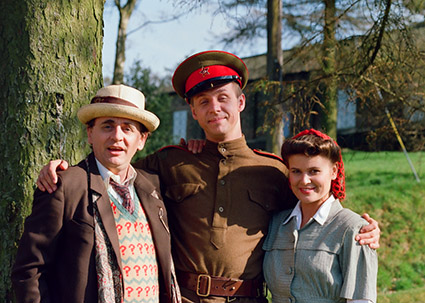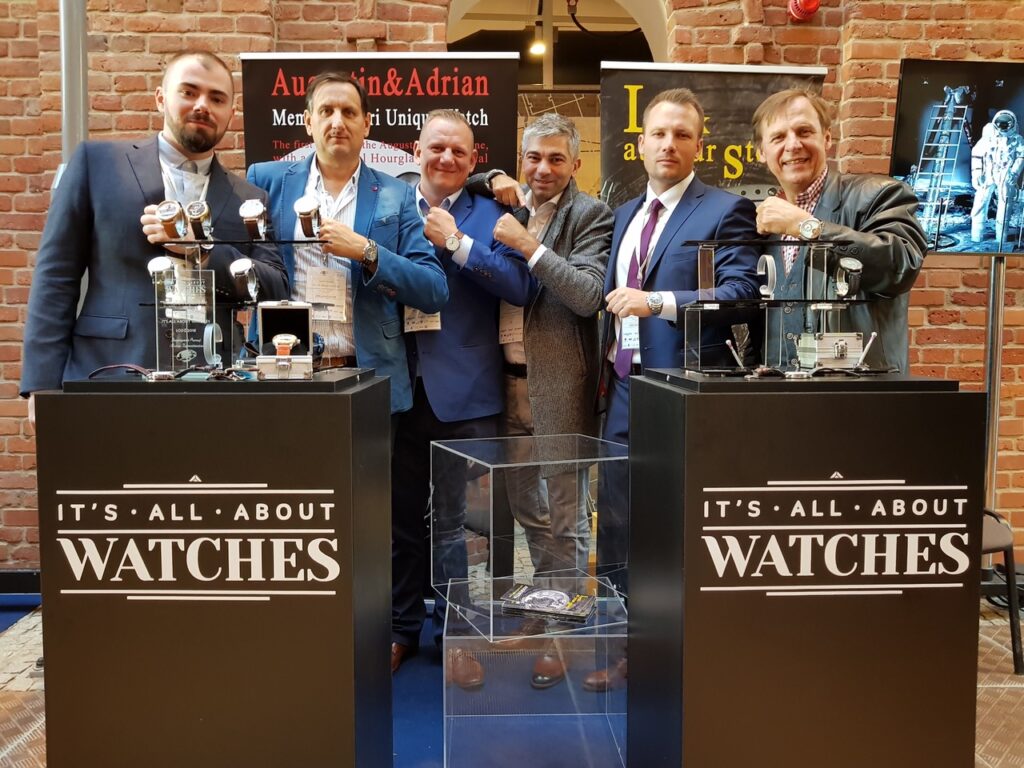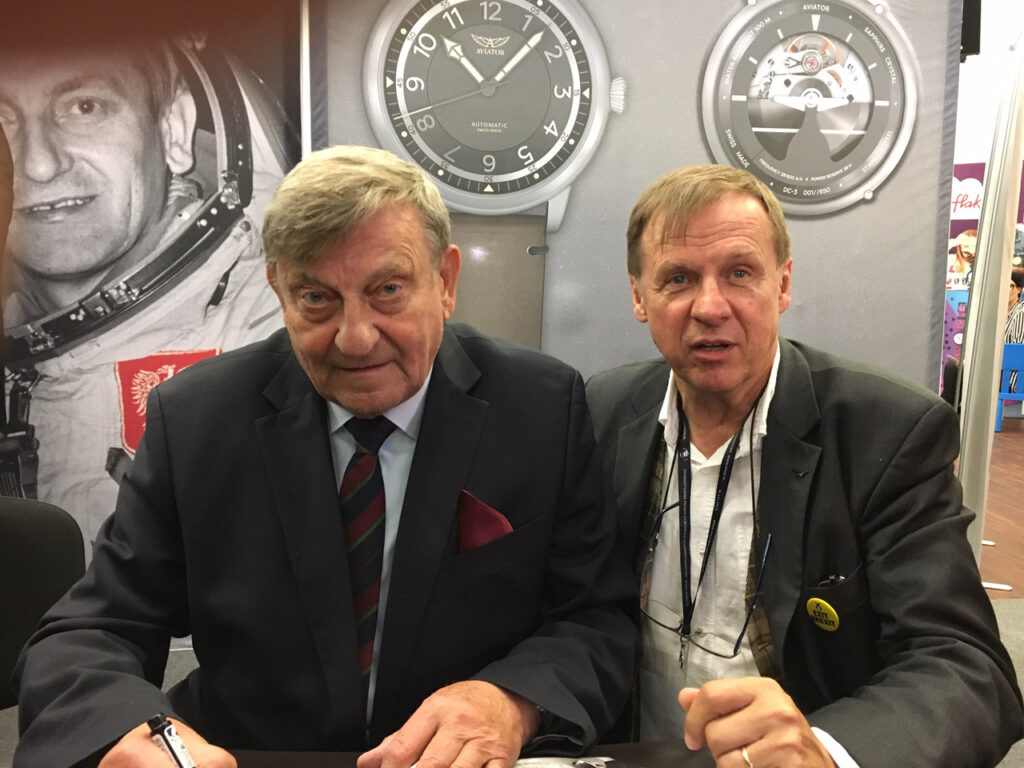
W połowie lat 80 Tomasz Borkowy zaczął dostawać więcej bardziej prestiżowych ofert, takich jak rola w serialu o podróżach w czasie, “Dr Who”. Gra tam u boku szkockiego aktora, Sylvestra McCoy, z którym przyjaźni się do dziś, i Sophie Aldred w roli Ace, towarzyszki Doktora. Tomek zagrał też w jednym ze swoich ulubionych seriali “Lovejoy”, gdzie w rolę tytułową wcielił się Ian McShane.
– To była niewielka rólka, ale byłem wielkim fanem serialu, więc kiedy agent do mnie zadzwonił natychmiast się zgodziłem. Ian McShane jest absolutnym dżentelmenem. – wspomina aktor – Nalegał, żeby przedstawić mi się już pierwszego dnia. Jest gwiazdą, a jednocześnie ma dużo pokory. Takie właśnie jest aktorstwo; prawie każdy, kto odniósł sukces, wie jak ważna jest pokora i wszyscy ją mają. Poza jednym aktorem, który był bardzo niemiły, kiedy go poznałem.
Kimkolwiek był ten nienazwany aktor, na pewno nie byli to Daniel Day Lewis ani Juliet Binoche, z którymi pracował na planie „Nieznośnej lekkości bytu”, nominowanego do Oskara filmu z 1987 roku.
Po przeprowadzce na stałe do Edynburga w 1991, Tomek założył Universal Arts – firmę produkującą i promującą spektakle teatralne dla publiczności brytyjskiej i międzynarodowej.
To oczywiste, że aktorstwo i teatr Tomek ma we krwi, ale to niejedyne jego pasje. Aktor wspiera szkocki ruch niepodległościowy, i – pomimo, że nazywa siebie socjalistą i przez wiele lat był członkiem partii – przyznaje, że nie miał świadomości politycznej, kiedy przybył do Wielkiej Brytanii.
– Wtedy uważałem Maggie Thatcher za bohaterkę – śmieje się aktor. – To dlatego, że wspierała Lecha Wałęsę i Solidarność.
Szybko jednak poznał prawdę i zrozumiał złożoność brytyjskiej polityki, a w szczególności sytuacji w Szkocji.
– Wiedziałem, że coś jest nie tak z tutejszą polityką.
Zauważyłem, że politycy angielscy traktują Szkocję jak swoje terytoria północne, ale początkowo nie chciałem wspierać żadnej partii. Jednak gdy zbliżał się termin referendum niepodległościowego, poczułem, że powinienem się zaangażować i na prośbę SNP zostałem “polską twarzą niepodległości”. Poznałem wtedy Nicolę Sturgeon, Mike’a Russella, a z Maciejem Dokurno – przyjacielem z Fife – założyliśmy polski oddział SNP, z nadzieją, że uda się namówić innych Polaków do głosowania.
Te wysiłki nie przyniosły oczekiwanego rezultatu, choćby dlatego, że wielu spośród około 50.000 uprawnionych do głosowania miało obawy, że będą musieli wyjechać ze Szkocji, gdyby niepodległość skończyła się jej wyjściem z UE, jak głosiły media i kampania Better Together (Razem Lepiej).
Teraz, gdy niepodległość może doprowadzić do powrotu Szkocji do UE, Tomek ma nadzieję, że rodacy zagłosują „Tak” w przyszłym referendum. Zachęca też Polaków, żeby mocniej zaangażowali się w swoich lokalnych społecznościach w Szkocji.
– Niektórzy Polacy myślą, że nie powinni mieszać się do lokalnej polityki, bo to nie jest ich sprawa. To nieprawda. Uważam, że każdy, kto osiedla się w Szkocji, powinien nauczyć się języka i pokazać, że chce być częścią społeczności. W przeciwnym razie żyje w getcie, a to nie jest miejsce, w którym można prosperować. Wyczekuję dnia, kiedy będziemy mieli polskiego członka Szkockiego Parlamentu.
Tomka komentarz dotyczący polityki w Polsce jest niecenzuralny. Aktor dodaje: – PiS, czyli partia rządząca, siedzi w kieszeni Kościoła Katolickiego. To niedobrze, że moim krajem kieruje kler.
Praca w teatrze w dobie covidu jest ograniczona do minimum, dlatego Tomek ma więcej czasu na kolejne hobby: renowację zegarków kieszonkowych i przywracanie im kopert.
– Znajomy zaczął je kolekcjonować, ja się wkręciłem i zaczęliśmy je naprawiać. Potem zdecydowaliśmy, że będziemy produkować własne koperty i koniec końców trafiłem do Chin, żeby dobić targu z fabrykantem.

Pomysł chwycił i od trzech lat ich zegarki biorą udział w Międzynarodowym Festiwalu Zegarków „It’s All About Watches”. Tomek i jego partnerzy biznesowi są już członkami Brytyjskiego Instytutu Zegarmistrzowskiego i przygotowują stronę internetową scotlandwatch.co.uk.
Nie tylko nazwa ich witryny zdradza przywiązanie do „adoptowanej ojczyzny”. Trzy pierwsze modele zegarków powiązane są ze Szkocją. Saltire* Day, Saltire Night and Saltire Northern Lights zostaną wyprodukowane w limitowanych edycjach po 150 sztuk, więc można się spodziewać, że wkrótce Tomek i jego wspólnicy będą eksportować odrobinę Szkocji do bogatych klientów na całym świecie.
* – “Saltire” to Krzyż Świętego Andrzeja, flaga Szkocji.
During the mid-1980s, more high-profile work was also coming Tomek Borkowy’s way, including a part in TV’s time-travelling series Dr Who with Scottish actor Sylvester McCoy, who remains a close friend, and the Doctor’s companion, Ace, played by Sophie Aldred. Other television work followed including a part in Lovejoy, starring Ian McShane, one of Tomek’s favourite television shows.
“It was only a small part, but I was a big fan of Lovejoy so when my agent called me about it I jumped at it. Ian McShane is a complete gentleman,” says Tomek. “He made a point of coming over to introduce himself to me on day one. He is a big star but he has such humility. That’s the thing about acting. Almost every successful actor I meet knows the importance of humility and they all have it – except for one particular actor I met who was very unpleasant.”
Whoever that unnamed actor might be, it is not Daniel Day Lewis nor Juliet Binoche, both of whom he worked alongside on the set of The Unbearable Lightness of Being, a 1987 Oscar-nominated hit.
Moving permanently to Edinburgh in 1991, Tomek set up his successful Universal Arts company producing and promoting theatre for UK and international audiences.
It’s clear acting and the theatre are in Tomek’s blood but he has other passions, too, including Scottish independence. Although he describes himself as a lifelong socialist and was for many years a member of the Polish Workers’ Party, he admits to not being fully politically aware when he first arrived in Britain.
“I thought then that Maggie Thatcher was a hero,” he laughs “because she played such a part in helping Lech Walęsa and Solidarność.” He soon learned the truth and gradually developed an understanding of the complex politics of the UK and of the situation in Scotland in particular.
“I knew something was wrong about politics here,” he says.
“I could see that politicians in England treated Scotland as though the country was their northern territories, but at first I did not want to support any political party. Then, as the independence referendum approached I felt I had to become involved and when the SNP asked me to become ‘the Polish face of independence’ I agreed. I met the likes of Nicola Surgeon and Mike Russell and with Maciej Dokurno, a Polish friend living in Fife, we started trying hard to bring other Poles to vote for independence by setting up a Polish branch of the SNP.”
Those efforts were not as successful as they would have liked, not least because many of the possible 50,000 or so Polish voters were concerned that they might have to leave Scotland if independence meant exit from the EU, a theory promoted by the Better Together campaign and much of the media.
Now that independence might lead to Scotland rejoining the EU, Tomek is hopeful that his countrymen and women might vote Yes in a future referendum. He also urges Poles to become more involved with their local communities in Scotland.
“Some Polish people think they should not interfere in politics here because it is not their business, but of course it is. I think everyone who comes here to live should learn the language and show that they want to be part of the community. Otherwise they are living in a ghetto and that is not a place where anyone can thrive. I am looking forward to the day when we have a Polish member of the Scottish Parliament.”
Meanwhile, looking back at political developments in Poland, Tomek’s description of the situation is unprintable but he adds: “PiS, the ruling party, are in the pocket of the Catholic Church. I wouldn’t want my country to be run by priests.”
With theatre work at a minimum during the covid crisis, Tomek is devoting more time to one of his more recent interests: refurbishing pocket watches which have lost their casings. “A friend had started to collect them and then I became involved and we started repairing them. Later we decided to start doing our own casings, and eventually I went out to China to arrange a deal with a manufacturer.”

The idea took off and for the past three years Tomek’s watches have been represented at the Polish International Clock and Watch Festival. Setting up a new business called It’s All About Watches, Tomek and his business partners have become members of the British Horological Institute and are preparing to launch their website at scotlandwatch.co.uk
And it’s not only the website name which betrays his close identification with his adopted country, the company’s first three watches have a Scottish theme. Saltire Day, Saltire Night and Saltire Northern Lights are to be made available in a limited edition of 150 of each design, so you can expect that soon Tomek and his associates will be exporting a little bit of Scotland to wealthy clients around the world.
